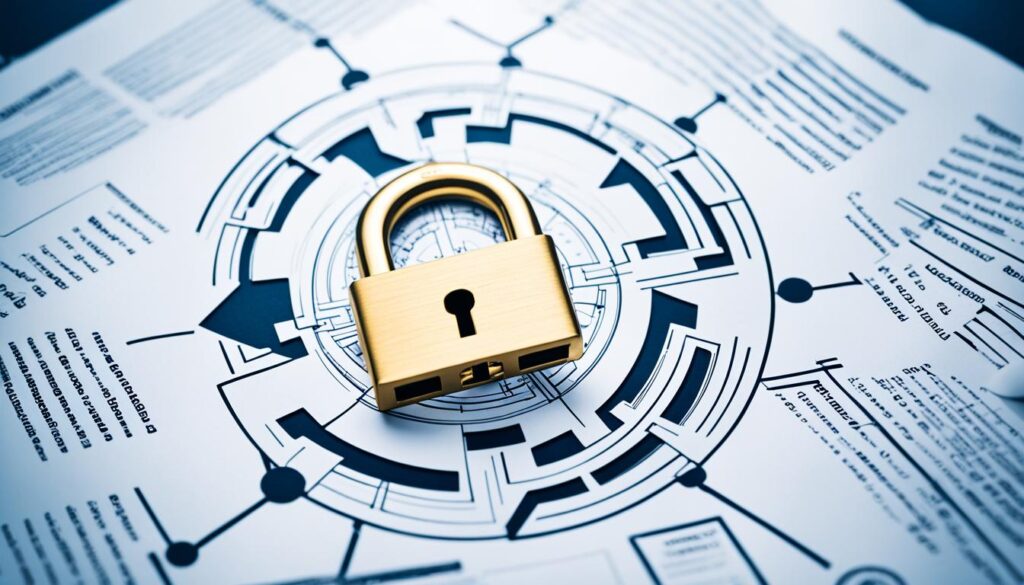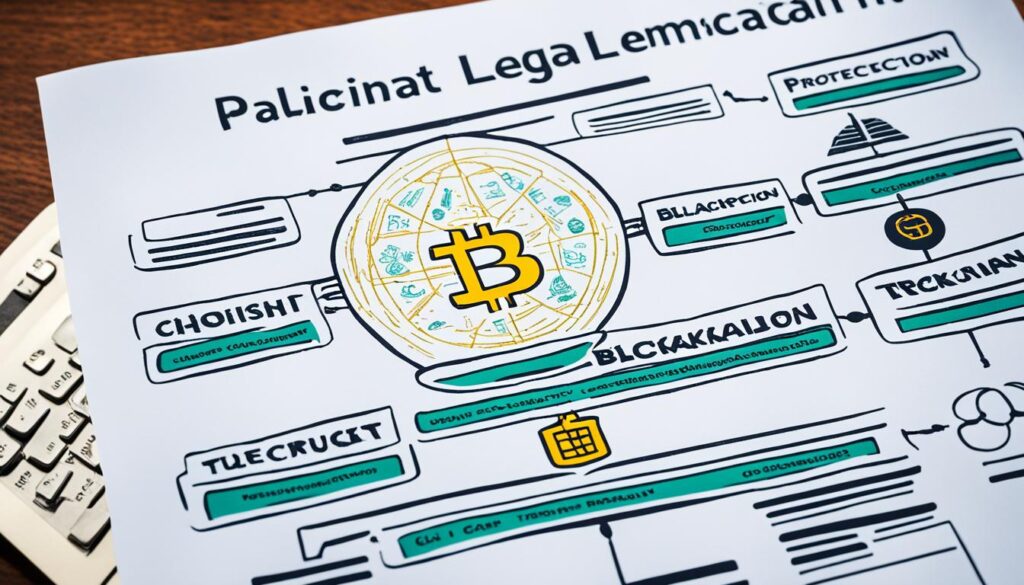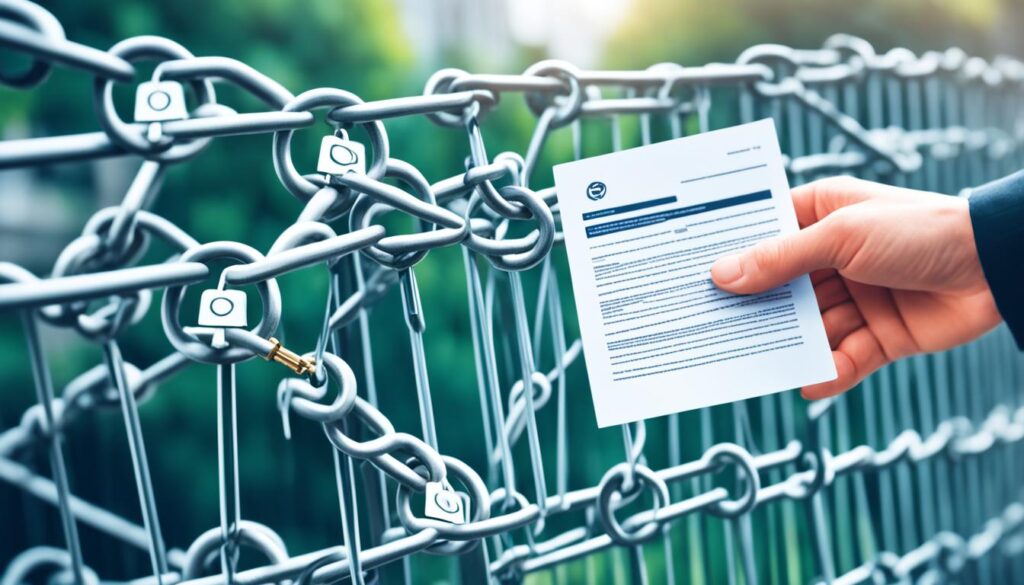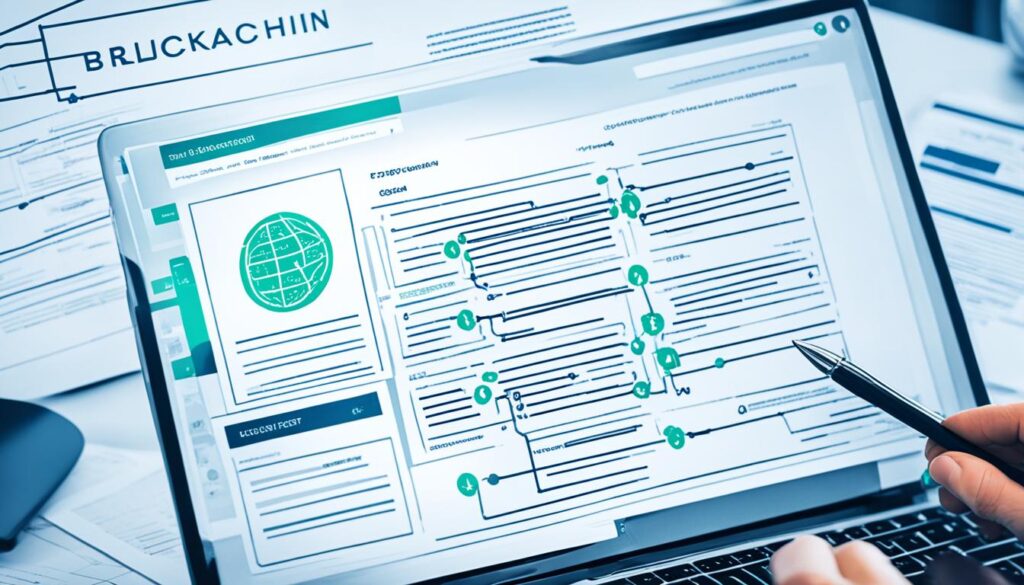Have you heard that blockchain technology is changing legal services and contracts? It’s securing and making things transparent across the board. With blockchain, the legal world gets a makeover. It offers better security, clear processes, and modern ways to handle documents.
Thanks to blockchain, law firms can keep client details safe in the digital age. This tech is reshaping how the legal industry works. It makes things smoother, lowers risks, and increases trust in legal deals.

Key Takeaways:
- Blockchain technology is transforming legal services and contract management, offering enhanced security and improved transparency.
- By implementing blockchain, legal firms can ensure the confidentiality of sensitive client data and streamline processes.
- Blockchain has wide-ranging applications in the legal industry, including smart contracts, land registry, and digital identity verification.
- This groundbreaking technology has the potential to revolutionize the legal landscape, improving efficiency and trust in legal transactions and documents.
- The future holds great potential for blockchain in legal services as the technology continues to evolve and its adoption increases.
What is the Blockchain for Legal Services?
Blockchain for legal services is changing how we handle legal documents and secure transactions. It makes managing and storing legal records safe and clear. This way, it protects sensitive information really well.
Blockchain helps manage legal documents in a big way. Legal firms can safely keep and find important documents on a decentralized network. This means they don’t need many copies, which lowers the chance of losing or changing data.
Also, blockchain makes legal deals more secure. It uses special algorithms and systems to make sure transactions are safe and cannot be changed. This lowers the chance of fraud and builds trust in legal dealings.
“Blockchain technology offers a transparent and immutable system for managing legal records and conducting legal transactions,” says Mark Johnson, a legal technology expert. “It enhances the security and trustworthiness of legal services, providing a seamless experience for both legal professionals and their clients.”
Blockchain also allows for better auditing and tracking of documents and transactions. Every action on the blockchain is recorded and marked with the time. This creates a clear track of actions, increasing trust and accountability in legal matters.
In summary, blockchain brings big advantages to the legal field. It improves how we manage documents, secures transactions, and makes things more transparent. It’s a strong tool that makes legal work easier and less costly in our digital world.
How will Blockchain Impact Legal Services?
Blockchain technology is set to greatly change the legal services industry. It will revolutionize how transactions and data are managed. This shift towards a digital era offers many benefits. These include improved trust, efficiency, and security.
Blockchain will change how client advisors work. With decentralized networks, clients can now directly access legal services. This cuts out the middleman. It makes the process faster and communication better.
Blockchain can improve land registry and deed management. Its secure, unchangeable nature makes land records more accurate and clear. The decentralized system keeps records safe, lowering fraud risk.
Smart contracts are another important development. They are contracts that execute themselves based on set conditions. Blockchain allows for automatic contract execution. This makes things faster and reduces the need for manual work. Smart contracts could remove the need for middlemen and lower costs.
Blockchain also makes maintaining public records more transparent and accurate. It securely saves transactions on a decentralized ledger. This makes the system safe from tampering. This transparency builds trust and lowers disputes.
Blockchain technology will change legal services for the better. It will make processes more efficient, transparent, and safe. Its impact will be seen in various areas such as client advising, managing of land records, contracts, and public records.
To show how blockchain could change legal services, look at this table:
| Impact Areas | Benefits |
|---|---|
| Client Advisors | Direct access to legal services, reduced reliance on intermediaries |
| Land Registry and Deed Management | Improved accuracy, transparency, and security |
| Contracts and Smart Contracts | Automation, reduced costs, elimination of intermediaries |
| Maintaining Public Records | Enhanced transparency, accuracy, and integrity |
As blockchain technology keeps growing, its effect on legal services will increase. Its widespread use could change the legal field, making it more efficient and safer. Legal experts must keep up with this technology to succeed in a digital world.

Benefits of Blockchain Technology for Legal Services
Blockchain technology is changing legal services for the better. It makes things more secure, efficient, and open. Here are the main reasons why legal practices are adopting blockchain:
1. Accessibility
With blockchain, getting to legal documents and services is easy, anytime and anywhere. Lawyers can share and look at important info safely. This makes everything run smoother, speeds up work, and lets people talk to each other without hassle.
2. Cost Savings
Blockchain helps legal services save money. It cuts out middlemen and reduces the need for paper, automating lots of tasks. Legal services become cheaper for clients. Legal firms also run more effectively, financially.
3. Transparency
Blockchain is all about being open. All transactions on the blockchain can be seen by people allowed to see them. This builds trust and cuts out middlemen and fraud risks. Lawyers can see all steps of a transaction, ensuring fairness.
“Blockchain technology offers enhanced accessibility, cost savings, and transparency in the legal services sector, transforming the way legal firms operate and ensuring trust in legal transactions.” – LegalTech Magazine
4. Data Integrity
Blockchain keeps legal data safe and unchanged. Because it is decentralized, no one can change legal documents without permission. This protects sensitive info and keeps the truth in contracts and agreements.
5. Automation
Blockchain allows legal processes to run on their own with smart contracts. These contracts do specific things when conditions are met without people getting involved. This makes processes faster, reduces errors, and boosts productivity.
Using blockchain in legal services can really change the industry. It brings trust, efficiency, and easier access. By taking advantage of blockchain, legal firms can improve their services for clients and handle digital challenges better.
| Benefits | Description |
|---|---|
| Accessibility | Easy access to legal documents and services |
| Cost Savings | Reduces administrative overhead and intermediaries |
| Transparency | Visible and immutable record of legal transactions |
| Data Integrity | Prevents tampering and ensures the authenticity of legal data |
| Automation | Streamlines processes through self-executing smart contracts |

How Do You Start Blockchain Development in Legal Services?
To start blockchain in legal services, follow a structured process. This helps legal firms use blockchain to improve their practices and services.
Identifying Use Cases
First, figure out where blockchain can help. Look at contract management, digital identity, intellectual property, and supply chain. Find places where blockchain can make things more efficient, secure, and clear.
Choosing a Blockchain Platform
After finding use cases, pick a blockchain platform. Look at its scalability, security, consensus mechanism, and community support. Ethereum, Hyperledger Fabric, and Corda are good choices for legal services.
Designing the Legal Solution
Designing the solution means making smart contracts and checking legal rules. Smart contracts help automate and streamline legal processes. They lessen the need for manual work and boost efficiency.
“Blockchain implementation requires careful consideration and collaboration with legal and technical experts. It is essential to design a legal solution that aligns with the specific needs and regulatory requirements of the legal firm.”
Also, make sure to improve security for legal info. Blockchain’s secure and tamper-proof nature helps keep data safe from unauthorized access, fraud, and breaches.

The image shows the steps to start blockchain in legal services. It goes from finding use cases to creating the legal solution.
This structured method helps legal firms begin with blockchain. It opens up blockchain’s transformative power for the legal industry.
Use Cases of Blockchain in the Legal Industry
Blockchain technology is changing the legal industry. It makes legal processes more transparent, secure, and unchangeable. In the legal field, blockchain has several important uses.
Electronic Signatures
Blockchain lets us use electronic signatures. This way of signing legal documents is secure and cannot be tampered with. Electronic signatures rely on the blockchain. This ensures they are real and cannot be reversed.
Securing Property Rights
Blockchain helps secure property rights. It does this by keeping a clear and checkable ownership record. With blockchain, property deals are safely recorded. This lowers the chances of fraud and disagreements.
Protecting Intellectual Property
Intellectual property rights are safer with blockchain. It creates a central place to register and track intellectual property. This protects these assets and stops unauthorized use.
Tokenization of Assets
Blockchain allows assets to be tokenized. This means you can own parts of assets and they are easier to sell. This is handy in the legal field for things like real estate or art. They can be split into parts, making them simpler to trade and move.
Automated Regulatory Compliance
Blockchain can make following rules automatic. It does this with smart contracts. These contracts check and follow compliance by themselves. This reduces manual checks. It also lowers the risks of not following rules.
“Blockchain offers a secure and open way to handle many things in the legal field. From signing documents electronically to managing property rights and following rules automatically, blockchain brings new, efficient solutions that build trust in legal work.”

Blockchain technology helps the legal field become more digital. It makes processes secure and efficient. This improves trust and effectiveness in legal dealings.
The Challenges in Utilizing Blockchain for Legal Services
Blockchain technology has many benefits for legal services, but it’s not easy to add it. Issues include regulatory uncertainty, technical challenges, data privacy, integrating with existing systems, and costs. To tackle these, it’s vital to plan well, work with experts, and keep up with legal requirements.
Regulatory Uncertainty: A big hurdle is the unclear rules around using blockchain in legal services. As blockchain grows, it’s hard for laws to stay up-to-date. This makes it uncertain and risky.
Technical Complexity: To use blockchain in legal services, you must understand complex tech. This includes how blockchains work and the platforms they run on. This can be tough for lawyers who don’t specialize in blockchain.
Data Privacy Concerns: Legal services handle very private info. Since blockchains are transparent, there’s worry about keeping client data and legal transactions private.
Integration with Existing Systems: Most legal firms already have their systems. Adding blockchain to these can be hard and disruptive. It requires good planning and a smooth way to include blockchain.
Cost of Implementation: Setting up blockchain tech is expensive. Costs include infrastructure, upkeep, and training. This can be a big barrier for some legal firms.
Quote: “Overcoming using blockchain in legal services needs strategy, working with experts, and understanding laws.” – LegalTech Magazine
Addressing the Challenges
Legal firms and tech companies must join forces to fix these challenges. This means tackling regulatory issues, making tech easier, improving data privacy, ensuring smooth integration, and being cost-effective.
Working with experts in law and blockchain helps deal with regulatory uncertainty. They ensure you follow the law and push for better rules.
To deal with tech complexity, legal pros need training on blockchain. This helps them get it and use it well.
We need smart solutions for data privacy. These might include special blockchain tech that keeps data private, even though blockchains are usually open.
To add blockchain to current systems, plan well and do it step-by-step. Look at what you have and see where blockchain fits. This way, there’s less disruption and more efficiency.
Managing blockchain costs means picking the right platform and using cloud services. Firms should think about all costs and benefits before starting.
In conclusion, using blockchain in legal services demands action and creativity. By fixing regulatory, technical, privacy, integration, and cost issues, the legal world can make the most of blockchain.

| Challenges | Description |
|---|---|
| Regulatory Uncertainty | Lack of clear regulations and guidelines for blockchain in legal services. |
| Technical Complexity | Understanding and implementing complex blockchain technologies. |
| Data Privacy Concerns | Ensuring privacy and confidentiality of legal transactions and client data. |
| Integration with Existing Systems | Seamlessly integrating blockchain with established legal systems and processes. |
| Cost of Implementation | Initial and ongoing costs associated with blockchain implementation. |
Why Should You Choose Webisoft to Implement Blockchain for Legal Services?
Webisoft shines in the blockchain technology field, especially for legal services. They bring deep expertise and a strong history in crypto legal services. This makes them a top choice for legal firms looking to adopt blockchain.
They craft customized solutions that improve legal processes, boost security, and assure compliance. This dedication to security and compliance helps legal firms trust in the power of blockchain.
By partnering with Webisoft, legal firms will benefit from:
- Expertise in Blockchain Technology: Webisoft has a team with great knowledge of blockchain. They mix this knowledge with the latest advancements to give clients top solutions.
- Customized Solutions for Legal Services: Understanding that every legal firm is unique, Webisoft tailors solutions that fit perfectly. This means legal firms can easily adopt blockchain into their work.
- Proven Track Record in Crypto Legal Services: Webisoft has a strong background in crypto legal services, showing they know how to make blockchain work for legal firms.
- Commitment to Security and Compliance: Keeping data safe and meeting regulations is key for Webisoft. Legal firms can feel secure in their blockchain projects with Webisoft’s high standards.
The Webisoft Advantage: Delivering Value and Innovation
What sets Webisoft apart is their commitment to their clients. They focus on bringing value and cutting-edge solutions through blockchain. This transforms the landscape of legal services.
Choosing Webisoft as your partner means stepping into the blockchain world with confidence. You’ll have a team of experts by your side. They ensure your legal firm will succeed in a digital future.

| Why Choose Webisoft? | Benefit |
|---|---|
| Expertise in Blockchain Technology | Access to the latest advancements and innovative solutions |
| Customized Solutions for Legal Services | Tailored blockchain solutions that address specific needs |
| Proven Track Record in Crypto Legal Services | Delivering successful projects and driving positive change |
| Commitment to Security and Compliance | Highest standards of security and compliance in blockchain implementations |
Technological Innovation: Generating Economic Results
This unique program unites talented graduate students from various fields. They work together on projects. These projects take promising research and turn it into ventures that make money. By doing this, the program boosts economic growth with new technological breakthroughs.
Unleashing the Potential of Graduate Students
Graduate students are key to this program. They bring new ideas and a passion for technology. Their drive and creativity boost the projects they work on.
Students get access to resources and advice to polish their ideas. They’re pushed to try new things, think creatively, and challenge old ways. This approach leads to innovation.
Transforming Research into Economically Productive Projects
The program finds research with economic potential. It uses the latest technology to change industries, start new markets, and grow the economy.
Cultivating an Environment of Innovation
“Innovation drives progress. We aim to build an ecosystem that encourages creativity, team effort, and innovative thinking. By supporting graduate students with resources and guidance, we foster an atmosphere where bold ideas can become successful businesses.”
– Dr. Samantha Davis, Program Director
Driving Economic Growth through Technological Advancements
The focus is on innovation to stimulate the economy. The program gathers skilled people. It pushes them to go beyond old ways. This paves the way for impactful economic advancements.
The future of innovation is bright through this program. Students work together, exploring different fields, on projects that can change industries and boost the economy.

Keep an eye out for more news and success stories. The Technological Innovation: Generating Economic Results program is shaping the future of tech and economic growth.
The Future of Blockchain in Legal Services
The future of blockchain in legal services is bright. More and more legal firms are seeing how blockchain technology can help them. It promises to change the legal industry by making transactions secure and efficient.
This way, it improves how data is seen and trusted.
Blockchain is changing the legal world by offering new chances. It’s transforming how things have always been done. Early users are already enjoying its benefits. This technology will keep on growing, making legal services better and more trustworthy.
Blockchain makes legal documents and transactions very secure. This reduces the chance of having data breaches or fraud. It’s a ledger that nobody can change. This makes legal records very clear and honest.
Blockchain can also make legal work faster and more accurate. By using smart contracts, legal firms can handle contracts without much human help. This saves time and reduces mistakes.
Blockchain is also improving how public records are kept. It makes strong and unchangeable registries, like for land or deeds. This gets rid of the middleman and makes records more reachable and correct.
Blockchain is set to be a big deal in legal services. It will help legal firms become more digital. This is key to making legal services better in the future.
Looking forward, blockchain will keep getting more popular among legal firms. Its ability to make things more secure, fast, and clear will draw more firms in. Using blockchain will make legal services work better for everyone involved.
The Benefits of Blockchain in Legal Services:
- Enhanced security and privacy through cryptography
- Improved transparency and accountability
- Efficient and automated contract management
- Seamless integration with existing systems
- Reduced costs and improved efficiency
- Immutable and tamper-proof records
The Challenges of Implementing Blockchain in Legal Services:
- Regulatory uncertainty and compliance
- Technical complexity and integration
- Data privacy and confidentiality concerns
- Change management and cultural adoption
- Cost of implementation and infrastructure
Legal firms can lead the digital change in legal services by facing these challenges. Blockchain’s future in legal services looks promising. It will keep on influencing how legal firms work and help their clients.

Conclusion
Blockchain tech is changing the way legal services and contracts work. It brings benefits like better security, more transparency, cost savings, and automation. By using blockchain, legal firms can update their operations, boost efficiency, and protect the integrity of legal deals and papers.
The future of blockchain technology in legal services looks bright as it grows and more firms use it. Blockchain’s secure and clear solutions could change how legal services are given and managed.
Many legal firms are starting to see how useful blockchain is. Its security and smooth processes will help change the legal field digitally.
In the end, using blockchain helps legal firms stay innovative. This ensures they provide top service, keep their clients’ trust, and make legal work more efficient.